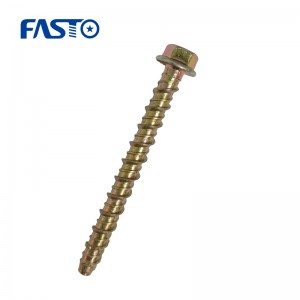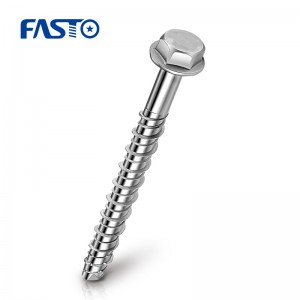Concrete screws are invaluable fasteners used in a wide range of applications, from construction projects to DIY home improvements. Their ability to securely attach materials to concrete surfaces, without the need for complex drilling or specialized equipment, makes them a popular choice for professionals and DIY enthusiasts alike. In this article, we will explore the various types of concrete screws, their advantages, and provide some essential tips for their proper use.
There are two main types of concrete screws commonly used: Tapcon screws and expansion screws
 1.Tapcon Screws: These screws are ideal for light to medium-duty applications. They have a special drill bit tip and unique threads for self-tapping into concrete or masonry. Tapcon screws often feature a slotted hex head or a Phillips head design, allowing for easy installation with a screwdriver or power drill.
1.Tapcon Screws: These screws are ideal for light to medium-duty applications. They have a special drill bit tip and unique threads for self-tapping into concrete or masonry. Tapcon screws often feature a slotted hex head or a Phillips head design, allowing for easy installation with a screwdriver or power drill.
2.Expansion Screws: Expansion screws, also known as wedge anchors or sleeve anchors, are more suitable for heavy-duty applications. They expand and create a secure grip within the concrete, providing excellent stability. Expansion screws often feature a hex head or a bolt-like design, allowing for installation with a wrench or socket.
3.Concrete screws are specifically designed to penetrate and anchor into concrete, masonry, or other solid surfaces. They feature unique threads that offer exceptional grip and maximize holding power. These screws are often made from hardened steel or coated with corrosion-resistant materials for long-lasting performance.
Tips for Proper Use:
1.Choosing the Right Length: Selecting the correct screw length is crucial to ensure a secure fastening. The screw needs to penetrate the base material  sufficiently, allowing for a secure grip without protruding entirely through the opposite side.
sufficiently, allowing for a secure grip without protruding entirely through the opposite side.
2.Preparing the Surface: Before installing concrete screws, ensure that the concrete surface is clean, free of debris, and any loose particles are removed. This will create a better bond and maximize the holding strength.
3.Proper Alignment: Always align the screw accurately with the intended mounting holes. This prevents unnecessary stress, reduces the risk of cracking, and ensures a stable attachment.
4.Installing with Care: Apply steady pressure during installation to avoid stripping the threads or damaging the screw head. Use the appropriate power level on your drill, and if using a manual screwdriver, ensure you have a firm grip.
Concrete screws are versatile, easy-to-use fasteners that provide reliable anchoring in a range of applications. Whether you are a construction professional or a DIY enthusiast, understanding the different types of concrete screws, their advantages, and following the proper installation techniques will help you achieve strong and secure connections to concrete or masonry surfaces. Remember to choose the right screw type, prepare the surface adequately, and install with care for optimal results.
If you need high quality products,please contact us.
Post time: Aug-21-2023
